We explain what the Trojan War was, the causes that originated it, and its characters. Also, what are its characteristics and consequences?
What was the Trojan War?
It is known as the Trojan War to central warfare in Greek mythology. He pitted the citizens of the city of Troy (also called Ilion), in western Anatolia (in Asia Minor), against the main Achaean kingdoms of ancient Greece and their allies (Danaans and Argives).
Greek historians of many later times held that the conflict occurred between the 12th and 13th centuries BC. C. According to traditional history, lasted a full decade, but it is unclear how much of the story mythical is true and how much confabulation.
The Trojan War is one of the most important incidents within the Greek epic and the Greco-Latin imaginary. Some of its episodes are narrated by Homer in the Iliad and partly in the Odyssey, although the latter is centered on the return home of one of the Greek leaders.
The conflict ended with the victory of the invading armies and the total destruction of Troy. According to the Greek historian Herodotus (484-425 BC), it was the beginning of the ancient enmities between the Persians and the Greeks.
In modern times the city and the event were thought of as purely mythological. However, in 1870 the Prussian archaeologist Heinrich Schliemann found the prehistoric remains of the city. Under them, there were different successive layers of archaeological remains, which suggest the existence of up to ten possible Troyas.
Trojan location
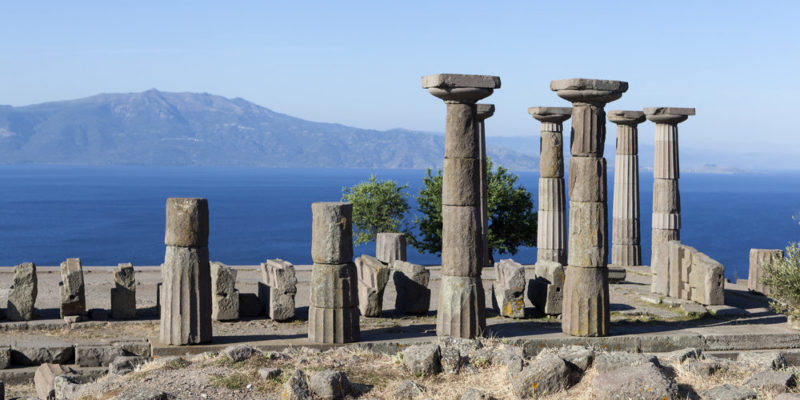
Troy was located in western Anatolia, present-day Turkey, on the Mediterranean coast of Asia Minor.
The archaeological site on Hisarlik Hill is currently in place. However, scholars assure that the city was founded and inhabited since the third millennium BC.
Causes of the Trojan War

Mythology tells that the Trojan War was caused by the abduction of the most beautiful woman in the world, Helen, wife of Menelaus, the King of Sparta. During a diplomatic mission of the Trojans, Prince Paris fell in love with her.
One version indicates that he seduced her and another that he kidnapped her. In any case, with the help of the goddess Aphrodite, he took her as his wife to Troy. Her husband Menelaus summoned the kings of the Achaean alliance in order to bring her back and cleanse her honor. They all pledged to support him in a war with the sole objective of recovering it and punishing the Trojans.
A less mythological view, however, points out that Troy was an important city on the eastern Mediterranean coast. Because of his control over trade to the Black Sea, he was the enemy to defeat the Greek kingdoms.
How long did the Trojan War last?
According to tradition, the siege of Troy lasted ten years, during which the Achaean troops camped around the city.
Main characters of the Trojan War
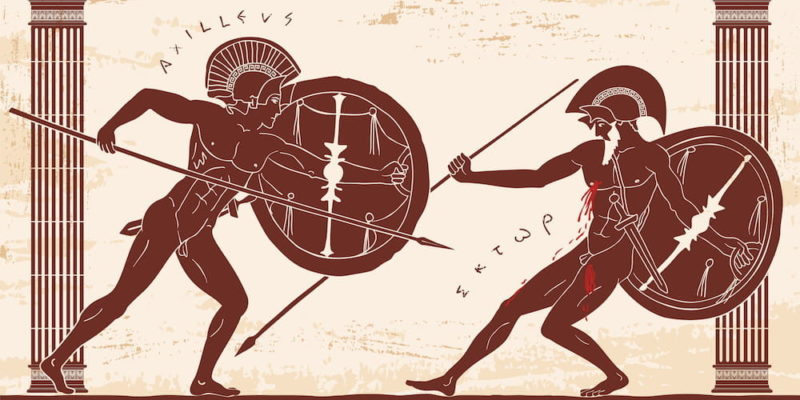
The narration of the Iliad is very abundant in characters, but the main ones for the story of the war are:
- Achilles. "He of the light feet", son of Peleus and king of the Myrmidons. At the beginning of the Iliad, he refuses to fight alongside the Greeks for an offense made by Agamemnon.
- Patroclus. Achilles' best friend and companion in his army. Hector kills him in battle believing him to be Achilles, as Patroclus dons his armor to inspire the Greek army.
- Agamemnon. Leader of the Achaean expedition, king of Mycenae, and brother of Menelaus.
- Menelaus. King of Sparta and husband of Helen of Troy, who demands that the Trojans return their weapons.
- Paris. Trojan prince and kidnapper of Helena had the favors of Aphrodite.
- Hector. Brother of Paris and the best of the Trojan warriors. He is killed in combat by Achilles and his body dragged from his cart as a form of derision.
- Priam and Hecuba. Kings of Troy and parents of Héctor and Paris.
- Odysseus. King of Ithaca and one of the great Greek heroes, inventor of the Trojan horse ruse.
- Ajax. Known as Ajax the Great or Ajax Telamonio (son of Telamon), king of Salamis and Peribea, he was the second Greek hero in courage and strength after Achilles.
The death of Achilles
During the Trojan War Achilles met his death. According to legend, this Greek hero was invulnerable, thanks to the crafts of his mother, the nymph Thetis. His only weak point was his heels.
He defeated the Trojan hero Hector in good law and thus avenged the life of his friend Patroclus. But he earned the fury of the Trojans and the Gods by dragging the corpse from his chariot, humiliating it on the battlefield.
Later, the punishment came to him in the hands of Paris, Héctor's brother, who pierced his heels with an accurate arrow. Thus he killed the great hero and fulfilled the prophecy that his mother had made him when he left for Troy.
The Trojan horse
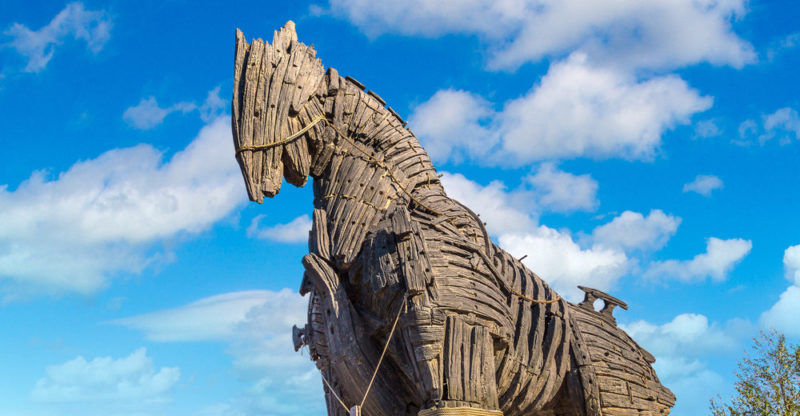
The strategy that brought victory to the Greeks is well known: the Trojan horse. The author of the idea was Odysseus, the most shrewd and resourceful of the Achaean leaders. He proposed to his companions to make a gigantic wooden horse. Inside the Greek soldiers hid.
After building it and leaving it by the sea, they withdrew the fleet and hid it behind some nearby cliffs, to pretend that they had surrendered and returned to Greece. The Trojans, devotees of Poseidon (who was associated with the horse) believed that it was a Greek offering to the god to grant them a good return home.
Joyful for his supposed victory, they took him inside the enormous and impenetrable walls of their city, to pay homage to their tutelary god. Once inside, the infiltrated soldiers waited until night to leave their hiding place and opened the city gates. Thus, the Greek army was able to loot and defeat Troy.
What did the victors gain?
The Trojan War was won by the invading army, thanks to the ploy of the horse. During the night, the city was invaded, looted, and destroyed, Trojan men and boys slaughtered, and women taken as slaves. Nothing was left standing of the ancient Asian city.
The soldiers distributed the spoils obtained from the looting. Furthermore, the first objective, which was to get Helena back, was accomplished. Although then the Greek armies undertook the return home, the cost of victory in Greek lives was very high.
Consequences of the Trojan War
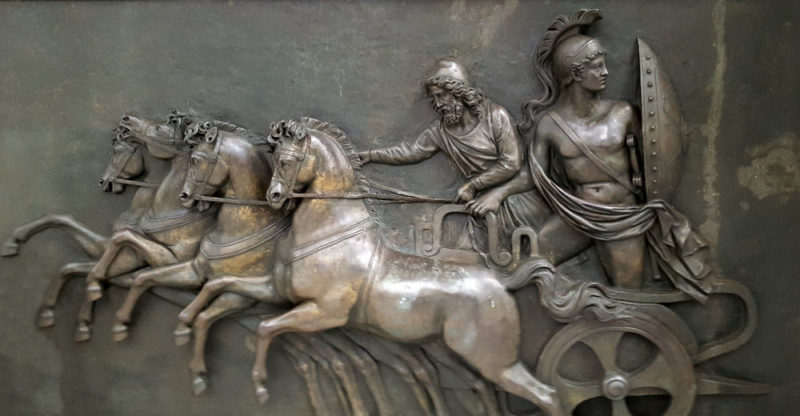
The consequences of the Trojan War were:
- The defeat of Troy and its looting and total destruction at the hands of Achaeans.
- The murder of King Priam and all the Trojan nobility, as well as the enslavement of their women.
- The loss of numerous lives on both sides, including great Greek heroes such as Achilles and Ajax, or the Trojans Hector and Paris.
- The beginning of the long journey back to Odysseus's house (as narrated in the Odyssey ).
- The beginning of the journey of Aeneas and the very few survivors of Troy in his feat that would lead them to found Rome (as fabled in the Aeneid ).
Myth and reality
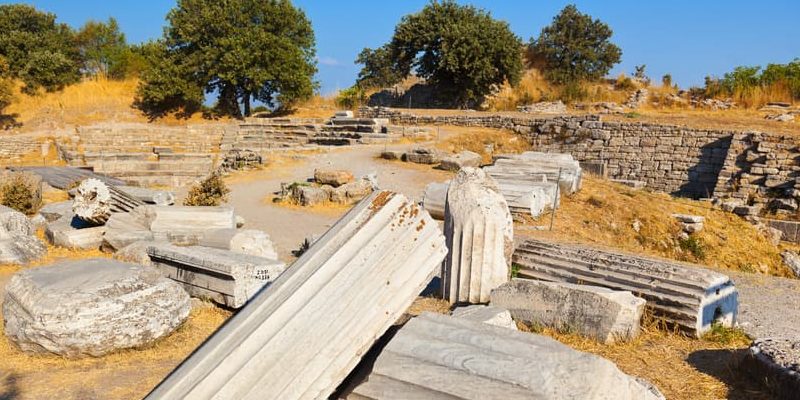
There are numerous interpretations of what is narrated by the myth of the Trojan War. Until the 19th century, it was thought to be purely mythical, a narrative representation of the numerous Greek women who were fought at the time. But the discovery of the ruins of Troy in Turkey contradicts this theory.
Works that narrate the Trojan War
The Trojan War and its consequences are the central axis of numerous literary works, some of which are:
-
- Homer's Iliad and Odyssey.
- Oresteia ( Agamemnon, the Coephoras and the Eumenides ) of Aeschylus.
- Ajax , Electra and Philoctetes of Sophocles.
- Iphigenia in Áulide , Andrómaca , Hécuba , Las Troyanas , Electra , Helena , Orestes and Reso of Euripides.
- Commendation of Helen of Theocritus.
- Poshomeric of Quintus of Smyrna.
- Aeneid of Virgil.
The above content published at Collaborative Research Group is for informational and educational purposes only and has been developed by referring to reliable sources and recommendations from technology experts. We do not have any contact with official entities nor do we intend to replace the information that they emit.
Luke is passionate about fostering student involvement and connection. He studied psychology for his major and likes learning about the past. Luke aims to specialize in artificial intelligence and cybersecurity. .
Leave a reply
Your email address will not be published. Required fields are marked *Recent post

Sport: What Is It, Types, Risks, Features, Characteristics and Examples

Dogs: Emergence, Features, Characteristics, Feeding and Breeds

Story: Definition, Elements, Structure, Features and Characteristics

